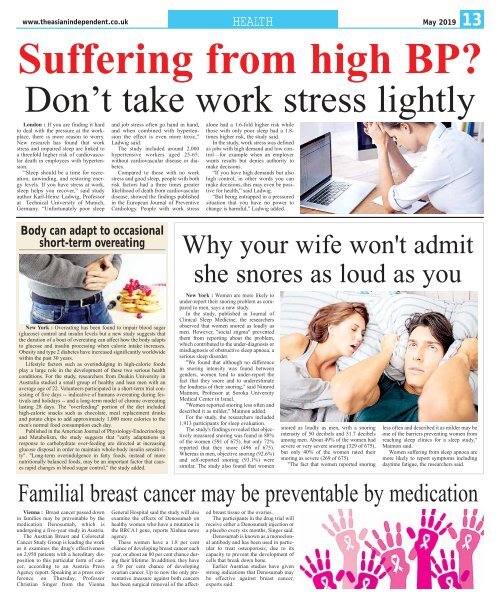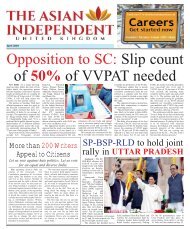You also want an ePaper? Increase the reach of your titles
YUMPU automatically turns print PDFs into web optimized ePapers that Google loves.
www.theasianindependent.co.uk<br />
HEALTH<br />
<strong>May</strong> <strong>2019</strong><br />
13<br />
Suffering from high BP?<br />
Don’t take work stress lightly<br />
London : If you are finding it hard<br />
to deal with the pressure at the workplace,<br />
there is more reason to worry.<br />
New research has found that work<br />
stress and impaired sleep are linked to<br />
a threefold higher risk of cardiovascular<br />
death in employees with hypertension.<br />
“Sleep should be a time for recreation,<br />
unwinding, and restoring energy<br />
levels. If you have stress at work,<br />
sleep helps you recover,” said study<br />
author Karl-Heinz Ladwig, Professor<br />
at Technical University of Munich,<br />
Germany. “Unfortunately poor sleep<br />
and job stress often go hand in hand,<br />
and when combined with hypertension<br />
the effect is even more toxic,”<br />
Ladwig said.<br />
The study included around 2,000<br />
hypertensive workers aged 25-65,<br />
without cardiovascular disease or diabetes.<br />
Compared to those with no work<br />
stress and good sleep, people with both<br />
risk factors had a three times greater<br />
likelihood of death from cardiovascular<br />
disease, showed the findings published<br />
in the European Journal of Preventive<br />
Cardiology. People with work stress<br />
alone had a 1.6-fold higher risk while<br />
those with only poor sleep had a 1.8-<br />
times higher risk, the study said.<br />
In the study, work stress was defined<br />
as jobs with high demand and low control—for<br />
example when an employer<br />
wants results but denies authority to<br />
make decisions.<br />
“If you have high demands but also<br />
high control, in other words you can<br />
make decisions, this may even be positive<br />
for health,” said Ladwig.<br />
“But being entrapped in a pressured<br />
situation that you have no power to<br />
change is harmful,” Ladwig added.<br />
Body can adapt to occasional<br />
short-term overeating<br />
Why your wife won't admit<br />
she snores as loud as you<br />
New York : Overeating has been found to impair blood sugar<br />
(glucose) control and insulin levels but a new study suggests that<br />
the duration of a bout of overeating can affect how the body adapts<br />
to glucose and insulin processing when calorie intake increases.<br />
Obesity and type 2 diabetes have increased significantly worldwide<br />
within the past 30 years.<br />
Lifestyle factors such as overindulging in high-calorie foods<br />
play a large role in the development of these two serious health<br />
conditions. For the study, researchers from Deakin University in<br />
Australia studied a small group of healthy and lean men with an<br />
average age of 22. Volunteers participated in a short-term trial consisting<br />
of five days -- indicative of humans overeating during festivals<br />
and holidays -- and a long-term model of chronic overeating<br />
lasting 28 days. The "overfeeding" portion of the diet included<br />
high-calorie snacks such as chocolate, meal replacement drinks<br />
and potato chips to add approximately 1,000 more calories to the<br />
men's normal food consumption each day.<br />
Published in the American Journal of Physiology-Endocrinology<br />
and Metabolism, the study suggests that "early adaptations in<br />
response to carbohydrate over-feeding are directed at increasing<br />
glucose disposal in order to maintain whole-body insulin sensitivity".<br />
"Long-term overindulgence in fatty foods, instead of more<br />
nutritionally balanced foods, may be an important factor that causes<br />
rapid changes in blood sugar control," the study added.<br />
New York : Women are more likely to<br />
under-report their snoring problem as compared<br />
to men, says a new study.<br />
In the study, published in Journal of<br />
Clinical Sleep Medicine, the researchers<br />
observed that women snored as loudly as<br />
men. However, "social stigma" prevented<br />
them from reporting about the problem,<br />
which contributed to the under-diagnosis or<br />
misdiagnosis of obstructive sleep apnoea, a<br />
serious sleep disorder.<br />
"We found that although no difference<br />
in snoring intensity was found between<br />
genders, women tend to under-report the<br />
fact that they snore and to underestimate<br />
the loudness of their snoring," said Nimrod<br />
Maimon, Professor at Soroka University<br />
Medical Center in Israel.<br />
"Women reported snoring less often and<br />
described it as milder," Maimon added.<br />
For the study, the researchers included<br />
1,913 participants for sleep evaluation.<br />
The study's findings revealed that objectively<br />
measured snoring was found in 88%<br />
of the women (591 of 675), but only 72%<br />
reported that they snore (496 of 675).<br />
Whereas in men, objective snoring (92.6%)<br />
and self-reported snoring (93.1%) were<br />
similar. The study also found that women<br />
snored as loudly as men, with a snoring<br />
intensity of 50 decibels and 51.7 decibels<br />
among men. About 49% of the women had<br />
severe or very severe snoring (329 of 675),<br />
but only 40% of the women rated their<br />
snoring as severe (269 of 675).<br />
"The fact that women reported snoring<br />
less often and described it as milder may be<br />
one of the barriers preventing women from<br />
reaching sleep clinics for a sleep study,"<br />
Maimon said.<br />
Women suffering from sleep apnoea are<br />
more likely to report symptoms including<br />
daytime fatigue, the researchers said.<br />
Familial breast cancer may be preventable by medication<br />
Vienna : Breast cancer passed down<br />
in families may be preventable by the<br />
medication Denosumab, which is<br />
undergoing a five-year study in Austria.<br />
The Austrian Breast and Colorectal<br />
Cancer Study Group is leading the work<br />
as it examines the drug's effectiveness<br />
on 2,950 patients with a hereditary disposition<br />
to this particular form of cancer,<br />
according to an Austria Press<br />
Agency report. Speaking at a press conference<br />
on Thursday, Professor<br />
Christian Singer from the Vienna<br />
General Hospital said the study will also<br />
examine the effects of Denosumab on<br />
healthy women who have a mutation in<br />
the BRCA1 gene, reports Xinhua news<br />
agency.<br />
These women have a 1.8 per cent<br />
chance of developing breast cancer each<br />
year, or about an 80 per cent chance during<br />
their lifetime. In addition, they have<br />
a 50 per cent chance of developing<br />
ovarian cancer. Up to now the only preventative<br />
measure against both cancers<br />
has been surgical removal of the affected<br />
breast tissue or the ovaries.<br />
The participants in the drug trial will<br />
receive either a Denosumab injection or<br />
a placebo every six months, Singer said.<br />
Denosumab is known as a monoclonal<br />
antibody and has been used in particular<br />
to treat osteoporosis, due to its<br />
capacity to prevent the development of<br />
cells that break down bone.<br />
Earlier Austrian studies have given<br />
strong indications that Denosumab may<br />
be effective against breast cancer,<br />
experts said.
















